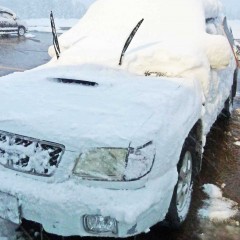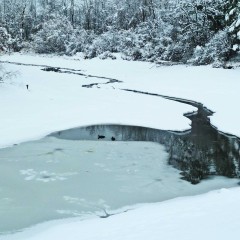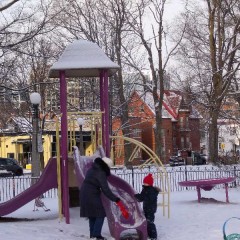Year’s first snowstorm may be followed by colder than normal winter
By Kyle Duggan and Brett Throop Ottawa will be whomped by the first snowstorm of the year Tuesday night, the first in a year that’s expected to be colder than usual, according to the national weather service. The weather service issued the winter storm warning for Tuesday night and Wednesday. Dave Phillips, Environment Canada’s chief climatologist, said there could be a significant amount of snow in the Ottawa area and there could be rain or freezing rain. “The morning commute might be a little bit on the messy side, with some blowing snow – that kind of a situation,” he said. The warning calls for 10-15 centimetres of snow Tuesday night, followed by another 5-10 Wednesday. “You haven’t had much of a winter. London’s had 60 or 70 centimetres of snow and Ottawa has had traces of snow, about six centimetres total,” Phillips said. He said this is nothing surprising. “It probably won’t be the biggest storm of the winter. There’ll still be lots of time for that.” Phillips said after the system passes through Ottawa and heads toward Quebec and the Maritimes, Ottawa should see “some very nice sunshine and temperatures a little on the cool side.” The weather warning cautioned driving conditions are expected to rapidly worsen tonight and tomorrow. City police reported over 50 accidents in an hour on Saturday after Ottawa’s first snowfall of the year. Look ahead Environment Canada is preparing its winter outlook and expects to issue it within the next week or so. But this year their crystal ball is a little cloudier than normal. Phillips said the water temperatures in the Pacific that normally control the winter aren’t warm or cold right now, making it hard to forecast. “There’s not a lot of skill in a forecast where the water temperature is rather neutral. It’s more for curiosity’s sake. I don’t think anybody should invest any money in it, or make any plans on it, or cancel your Florida trip,” he said. But Phillips said it’s clearly going to be more of a winter than it was two years ago, “when we almost cancelled winter.” That was one of the warmest Ottawa winters on record with about half the usual snowfall. Last winter, he said, was slightly warmer than normal, with about 12 per cent more snowfall than usual. “My sense is this year we may be colder than last year but we may not see as much snow,” he said. But Phillips said he wouldn’t bet the family farm on it. “There’s no guarantees with weather in Canada, that’s for sure,” he said. Ready for winter Carleton University students waiting...
Winter bite prompts seasonal depression
By Sarah Trick and Allison McNeely Photo by Shannon Lough The snow, cold temperatures and dark skies of winter cause many people to feel a little down, but for some it can trigger a serious mood disorder. It’s more than the winter blues. Professionals call it seasonal affective disorder. Delaney Dunlop, 23, has had winter depression every year since she was a child, “It’s hard because I lead a very busy lifestyle. I’m constantly going places and doing things, but as soon as the fall hits, I don’t want to go anywhere or do anything.” The main symptom of any kind of depression is a loss of energy, according to Marie Clemont, a counsellor with Catholic Family Service Ottawa. In the case of winter depression, Clemont said medication can be useful, but should be used as a last resort. ‘I definitely think the medical establishment needs to take it more seriously.’ –Delaney Dunlop A treatment that helps many is light therapy, which consists of sitting in front of a special kind of lamp for 20-30 minutes per day. But not everyone has this option. Dunlop said she is unable to use light therapy because of a sensitivity to light. But she noticed this fall that spending a little more time outside has helped. She is currently studying criminology in the MA program at the University of Ottawa after doing her undergraduate degree at Carleton, where underground tunnels connect the buildings. Dunlop said she notices her grades usually drop in the fall, but at the University of Ottawa she is now forced to spend some time outside going to classes, unlike at Carleton. Dunlop said she feels doctors brushed off her condition at first. “I definitely think the medical establishment needs to take it more seriously,” Dunlop said. “Doctors don’t seem to want to deal with it.” Krista Shackleford, 31, has also suffered from the disease for several years. She says the most effective coping strategy is to deal with the symptoms before they become too severe. “I think being aware of your body is important,” Shackleford said. “I find if I ignore the symptoms too long, I get stuck in this vicious circle where I don’t want to exercise or do anything at all to make it better.” She said the best way to be supportive of someone with the disorder is to be encouraging but not forceful. “Try to get them to get out and do things, but don’t drag them out of their comfort zone too much,” she said. “For example, instead of having them go out of their way you could go watch a movie at their...
Winter activities in the works for popular Centretown Park
By Brett Throop and Kyle Duggan A Dundonald Park working group is urging people to come out and play in the park during the winter months. The park, a century-old Centretown landmark on Somerset Street at Bay Street, is a hub for community activities in the summer and one of the most trodden parks in the city. But when the mercury plummets, the visitors dwindle, a 2012 report by a Toronto-based urban consulting firm found. The report researched use of the park and how to improve it. Among other things, it found the park sees about six times fewer visitors in winter. “We are really encouraging people to keep using their community park,” said Christina Marchant, director of Community Health Promotion at Centretown Community Health Centre. The centre works closely with the Dundonald Park working group, which is in charge of getting more visitors to the park based on recommendations from the report. The working group is looking at activities such as cross-country ski and show-shoe lessons, Chinese New Year celebrations and a winter carnival. The carnival could include a snowman making competition, roasted-chestnut vendors and a park-lighting celebration. During summer, the park’s calendar is filled with daily tai chi classes, children’s music programs, line and folk dancing and movie nights. But there is only one listing for November and December on the park’s online calendar of events: a free weekly community meal held by Food Not Bombs. “When it gets to be winter we all want to cocoon a bit more and then our physical activity levels can go down,” Marchant said. “That’s not very healthy for us.” Marchant said that social isolation is greater in winter when people spend more time indoors, and that isolation is a year-round issue for many in Centretown who face language and income barriers. “Getting people out into the park in the winter is a way to break some of that isolation, maybe make some friends and basically support people’s mental health,” she said. Since new activities aren’t expected on the calendar this year, Marchant said the focus is currently on getting people to make their own fun. A group of Algonquin College students is working with the health centre to develop posters to encourage people to enjoy classic winter activities like making snowmen and snow angels in the park. “Once you’re moving and running around and having fun, you don’t feel the cold anymore,” said Mary O’Reilly, one of the students who designed the posters. “We don’t get enough sunlight, so having access to sunlight at all is very beneficial for your mood and getting out and being with...



